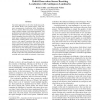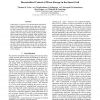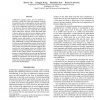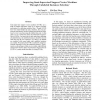AAAI
2011
12 years 11 months ago
2011
We propose CCRank, the first parallel algorithm for learning to rank, targeting simultaneous improvement in learning accuracy and efficiency. CCRank is based on cooperative coev...
AAAI
2011
12 years 11 months ago
2011
Successful approaches to the robot localization problem include Monte Carlo particle filters, which estimate non-parametric localization belief distributions. However, particle �...
AAAI
2011
12 years 11 months ago
2011
Transfer learning allows knowledge to be extracted from auxiliary domains and be used to enhance learning in a target domain. For transfer learning to be successful, it is critica...
AAAI
2011
12 years 11 months ago
2011
In this paper, we propose a novel decentralised control mechanism to manage micro-storage in the smart grid. Our approach uses an adaptive pricing scheme that energy suppliers app...
AAAI
2011
12 years 11 months ago
2011
Collaborative tagging systems are now deployed extensively to help users share and organize resources. Tag prediction and recommendation systems generally model user behavior as r...
AAAI
2011
12 years 11 months ago
2011
AAAI
2011
12 years 11 months ago
2011
When mobile robots perform tasks in environments with humans, it seems appropriate for the robots to rely on such humans for help instead of dedicated human oracles or supervisors...
AAAI
2011
12 years 11 months ago
2011
Semi-supervised support vector machines (S3VMs) are a kind of popular approaches which try to improve learning performance by exploiting unlabeled data. Though S3VMs have been fou...
AAAI
2011
12 years 11 months ago
2011
Plan recognition is a form of abductive reasoning that involves inferring plans that best explain sets of observed actions. Most existing approaches to plan recognition and other ...
AAAI
2011
12 years 11 months ago
2011
A common approach in machine learning is to use a large amount of labeled data to train a model. Usually this model can then only be used to classify data in the same feature spac...




